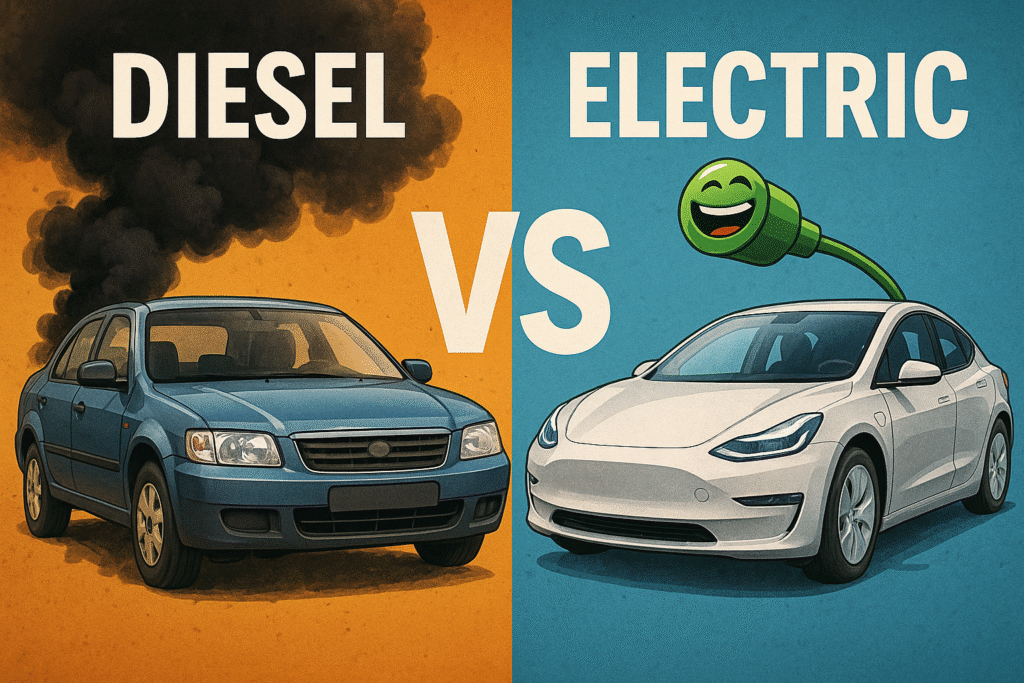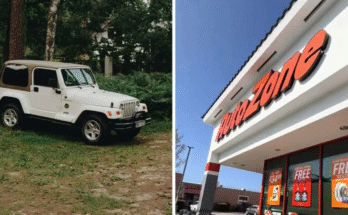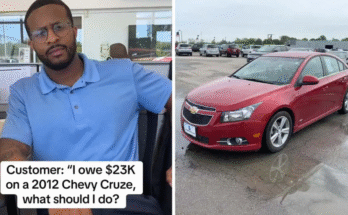Diesel brings power, but electric brings the future. In 2025, it’s torque vs. tech, noise vs. silence, smoke vs. clean energy. Which one deserves a spot in your garage? The answer might surprise you.

By Trendingshare | July 14, 2025
On a quiet morning in the suburbs of Denver, a Ford Super Duty roars to life, its turbo diesel engine growling as it warms up. Two houses down, a Tesla silently glides out of the driveway with barely a sound. No revving, no puff of smoke — just sleek silence.
This is the daily scene across America, where traditional power meets next-gen tech. And it raises a question every car buyer faces in 2025:
Should you drive diesel or electric?
Let’s dig into the battle of torque vs. tech, smoke vs. spark, with a clear-eyed comparison — and a little humor along the way.
⚙️ Old-School Muscle Meets Silicon Valley Cool
Diesel trucks and SUVs are still beloved by rural drivers, cross-country haulers, and heavy-duty users. They pull boats, trailers, and toy haulers across long distances with ease. Their low-end torque and fuel efficiency on highways are hard to beat.
But they’re also loud, dirty, and not exactly gentle on the environment — or on your lungs.
Electric vehicles (EVs), meanwhile, are redefining performance. With instant torque, whisper-quiet motors, and zero tailpipe emissions, EVs are attracting suburban families, city commuters, and tech-savvy millennials alike.
“My diesel growls like a beast,” says Mike, a construction foreman in Texas.
“My EV? It purrs like a spaceship,” replies Jasmine, a software developer from Seattle.
🌎 The Climate Equation: Are You Driving Into the Future?
Climate concerns are no longer just headlines — they’re shaping the car market. States like California and New York are phasing out combustion engines. Meanwhile, federal EV incentives and rebates are pushing Americans toward electrification.
Diesel vehicles, while efficient for long drives, produce CO₂, nitrogen oxides, and particulates that contribute to smog and health issues. That’s why older diesel trucks are already banned in some major cities.
Electric cars, especially when powered by renewable energy, have a much smaller carbon footprint. No oil changes. No gas pumps. Just plug in, charge up, and drive.
But remember: EVs are only as clean as the grid they charge from. In coal-powered states, their environmental edge may shrink.
💸 Cost Breakdown: Sticker Price vs Lifetime Value
A diesel vehicle might look cheaper upfront — especially in the used market. But after factoring in oil changes, engine servicing, DEF (diesel exhaust fluid), and higher fuel costs, ownership can get pricey over time.
EVs tend to cost more initially, though prices are falling fast. Federal tax credits (up to $7,500 in 2025), lower maintenance costs, and reduced charging expenses give EV owners a significant long-term advantage.
“I used to spend $100 on diesel every week,” says Todd, a truck driver from Iowa.
“Now I charge at home overnight for under 10 bucks.”
⚡ Performance: Which One’s More Fun?
Let’s talk power. Diesel engines shine when it comes to torque — perfect for towing and carrying heavy loads. But they take a while to get up to speed.
EVs? Different story. With instant torque, even the humblest compact EVs can launch off the line like a sports car. No gears. No waiting.
That’s why Teslas are showing up at drag strips. And winning.
Diesel says: “I’ll get to 60 when I’m good and ready.”
Electric says: “I already got there. Twice.”
🛠️ Repairs and Maintenance: Who’s Cheaper to Keep?
Diesel engines are complex machines. Between fuel injectors, turbochargers, and particulate filters, there’s a lot to break — and even more to maintain.
EVs, by contrast, have far fewer moving parts. No engine oil. No transmission fluid. No spark plugs. That means fewer repair bills and less time at the shop.
“My diesel needed a mechanic every few months,” says Dan, a retired Marine from Florida.
“My EV? I only see the service center for tire rotations.”
🧭 Who Should Drive What?
✅ Choose Diesel if:
- You tow heavy loads regularly (campers, trailers, boats)
- You live in a rural area with long-distance drives
- You prefer raw, mechanical power and aren’t concerned about emissions
✅ Choose Electric if:
- You live in a city or suburb with access to charging stations
- You want low-cost commuting with little maintenance
- You care about the environment — and your neighbors’ ears
“Diesel got us here,” says one Wyoming rancher.
“But electric is how we move forward,” replies a Tesla owner in Los Angeles.
🔌 Infrastructure and the Road Ahead
EV charging stations are expanding rapidly across the U.S. — from Target parking lots to highway rest stops. In 2025, most states now have EV incentives, and major automakers like Ford, GM, and Hyundai are racing to electrify their fleets.
Still, charging speed and rural access remain hurdles. Until battery range extends and nationwide fast-charging becomes the norm, diesel will still have a seat at the table — especially off the beaten path.
🏁 Final Word: What Moves You?
The diesel vs electric debate isn’t just about horsepower. It’s about priorities: power vs planet, tradition vs technology, short-term vs long-term savings.
Whether you love the rumble of a turbo diesel or the whisper of electrons flowing, remember: the car you drive today says something about where you’re headed tomorrow.
So choose wisely. Because the future is coming fast — and it might not make a sound.
📢 Like this story? Share it with a friend choosing their next ride. For more smart auto insights, follow Trendingshare


